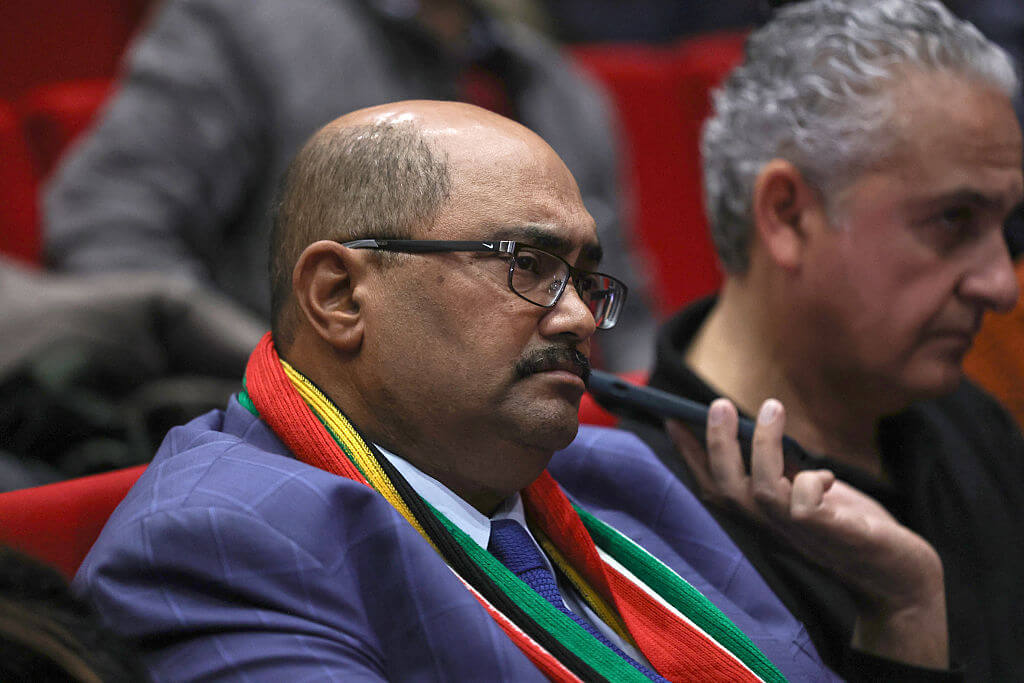Arab States Push To Reaffirm Proposal for Treaties and Ties
Desperate to kick-start the deadlocked Middle East peace process, Arab states are pushing to reaffirm their 2-year-old proposal to normalize relations with Israel in exchange for a negotiated peace, diplomats and observers said.
Already, however, the issue of Palestinian refugees is emerging as a major sticking point to formulating a comprehensive plan. Palestinian, Arab and Western officials were scrambling this week to deny a report published in the Kuwait newspaper As-Siyasa claiming that Saudi Arabia was drafting a proposal that would call for the resettlement of up to 2 million refugees in Arab countries and the rest in a Palestinian state.
Palestinian Authority Foreign Minister Nabil Shaath called the report “nonsense,” and Saudi officials denied such a plan was in the offing. Shaath was quoted by the Arab press as saying that Saudi Arabia was merely trying to formulate a proposal linking an Arab League resolution passed in March 2002 — which simply called for a “just and agreed upon” solution to the refugee issue — and the U.S.-backed “road map” peace plan. Edward Abington, a former U.S. consul in Jerusalem who now serves as an adviser in Washington to the Palestinian Authority, said that Jordan, Egypt and Saudi Arabia were “frustrated” by the passivity of the Palestinian Authority and were hoping to re-energize peace efforts through the Arab League. They fear that Palestinian apathy, combined with the policies of Israeli Prime Minister Sharon and the presidential election in America, could cause long-term and possibly irreversible damage to the already-ailing peace process, Abington told the Forward.
According to Abington, senior Saudi officials had conveyed their message in recent visits to Arab countries, and King Abdullah of Jordan and his country’s foreign minister, Marwan Muasher, had urged a “dusting-up” of the 2002 initiative.
The formulation of a new resolution will be a major topic of discussion at several upcoming working sessions and a meeting of foreign ministers preceding an Arab League summit in Tunisia in late March, Western and Arab diplomatic sources said. The resolution would update the Saudi-sponsored measure passed two years ago at an Arab summit in Beirut offering Israel the prospect of normalization of its relations with the Arab world in exchange for a withdrawal to the borders of June 4, 1967.
“The Arab states told us they want to introduce something at the next Arab League summit that will lead to further discussions,” said a State Department official, who asked not to be identified. The official cited Jordan, Egypt and Saudi Arabia as the main proponents of a new initiative. “The Kuwaiti report [on refugees] is interesting but not likely to go far at the Arab League because of the opposition from the Palestinians and other countries.”
Still, the State Department official added, the Arab countries have told U.S. officials that they are debating ways to lay out some basic principles regarding so-called final issues like Jerusalem, borders and refugees. Whether this will entail a reference not only to the road map, but also to more specific solutions laid out in private peace initiatives like the so-called Geneva Understandings, remains to be seen.
“There is still a lot of debate going on,” the State Department official said.
Meanwhile, in Israel, Prime Minister Ariel Sharon was set to meet this week with Giora Eiland, the new chairman of the National Security Council, to give him instructions for the designation of a “security line” to which Israel will withdraw as part of the overall plan for disengagement from the Palestinians.
The Prime Minister’s Office said yesterday that Sharon has been meeting with Eiland regularly, at least once a week, and has been closely following the formulation of a disengagement program. For the first time, Eiland convened an interministerial “disengagement committee” on Monday, naming four separate teams — security, economic, legal and humanitarian — to work out various aspects of the plan.
The legal and economic teams are supposed to examine the implications of withdrawing from settlements and come up with a proposal for compensation of the settlers to be moved, as well as legislation required for moving settlements.
Sharon wants to have a relatively well-formulated disengagement plan ready for meetings he plans next month with top administration officials in Washington. His bureau chief, Dov Weisglass, visited the White House last week and learned that the Americans would support moves that fit in with President Bush’s two-state vision. Sharon will present a more detailed plan to the Americans than the one relayed by Weisglass.
While Sharon is feeling out the Bush administration, Arab diplomats are saying that they are hoping to do a better job of promoting any new initiative adopted on their side.
“The Arab peace initiative of Beirut was undersold by the Arab side, unfortunately,” said Prince Zeid Ra’ad Zeid Al-Hussein, Jordan’s ambassador to the U.N. The previous resolution, he added, addressed all of Israel’s long-term concerns, but achieved little recognition.
“If you twin this [new resolution] with the road map and something like the Geneva accords, I think the end solution for Middle East peace is there,” the Jordanian ambassador said. “The challenge is to stitch all those parts together.”
The Arab League’s 2002 initiative, which was led by Saudi Arabia, petered out after a wave of deadly bombings in Israel, most notably one during a Passover Seder in Netanya. At the time, Israeli and American Jewish communal officials hinted that the initiative was merely a Saudi effort to ward off a post-September 11 wave of American criticism for its role in fostering terrorism.
But Henry Siegman, the dovish former head of the American Jewish Congress who, along with New York Times columnist Thomas Friedman, helped float the Saudi-backed measure in early 2002, said that the kingdom was genuinely worried about the situation on the ground.
“I believe there will be a restatement of the Arab League proposal,” said Siegman, who is now the director of the U.S./Middle East project at the Council on Foreign Relations. “There might be ideas under discussion, but no formal proposition on refugees.”
While most experts and diplomats agree that a solution to the refugee issue would entail the resettlement of virtually all of the refugees outside of Israel in a future Palestinian state and other countries, a stance that Palestinian leaders have refused to endorse. A Palestinian official privately expressed “alarm” that some Arab states — presumably including Saudi Arabia — were taking stances on the Israeli-Palestinian conflict without consulting the Palestinian Authority.
“No one has the right to talk about the refugee issue besides the Palestinians,” the official said.
Two years ago, the central committee of Fatah, the ruling party in the Palestinian Authority, issued a statement describing the Saudi initiative as another “stab” against the struggle of the Palestinian people.
At the 2002 Beirut summit, Lebanon and Syria campaigned for the inclusion of a reference to United Nations Resolution 194, which emphasizes the Palestinian right of return to Israel. A compromise was eventually reached, citing the resolution but stating that the league would support any agreement between Israel and Palestinians on the issue.
Similar Palestinian criticism greeted the Geneva initiative’s formula to send most of the refugees to third countries and only a symbolic number to Israel.
















